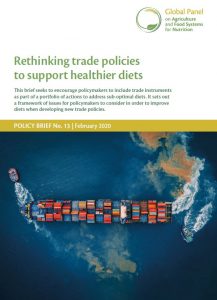Putting nutrition at the heart of trade policy

Launch of a new Policy Brief on Trade and Nutrition
14 Feb 2020 – The Global Panel on Agriculture and Food Systems for Nutrition is today announcing the launch of its latest policy brief, Rethinking trade policies to support healthier diets.
This new brief is a call to action to align trade policies with the goal of providing healthy and sustainable diets for all. It argues that the economic gains from the trade of foods which fail to support high quality diets must be balanced against the economic losses that result from poor health and inadequate nutrition. In the run up to the 3rd Nutrition for Growth Summit in Tokyo 2020, now is the time for policy makers to act to align nutrition goals with those of trade.
Professor Srinath Reddy, Global Panel Member and President of Public Health Foundation India said that “trade policy instruments should be part of any government’s toolkit for improving diet quality for their populations”. He added, that given the scale and devastating impact of malnutrition, it is imperative that no policy tool to address suboptimal diets is overlooked’.
The Global Panel urges governments and other stakeholders to respond to the nutrition crisis in low and middle income countries by better aligning trade policies with goal of delivering healthy, affordable and sustainable diets for all. Current trade policies are driven by goals which have little to do with diets and nutrition, and typically relate to issues such as economic growth, incomes, jobs and foreign earnings.
This is despite the fact that diets around the world are significantly affected by trade policies, and there is a large disparity between the food that we should be eating and what is actually produced and traded.
This new brief brief highlights global and regional trends in food trade, and the multiple influences of trade on diet quality, including its impact on the availability and price of nutrient-rich foods; on food safety and price volatility; and on climate change adaptation and resource degradation.
The Global Panel proposes a series of policy actions and opportunities for leveraging trade to improve diets with the following top-line messages:
- Close attention should be paid to trade policies that influence the relative price of foods within domestic markets. Trade policies have the potential to shift incentives in ways that support higher consumption of particular foods.
- High priority should be given to trade policies that specifically help to increase the availability, and to reduce the price of, nutrient-rich foods. These foods are generally more expensive than nutrient-poor foods and tend to be less affordable to low income consumers.
- Policymakers should be alert to the effects of trade policies on the availability and pricing of imports of ultra-processed foods. Some processed foods such as canned fruit and vegetables may have relatively high standards of food safety and can be helpful in delivering healthy diets, but there is evidence of high-consumption of ultra-processed foods being associated with adverse health impacts
- Policymakers should pay close attention to trade agreements which embody strong investor protections, as they can be problematic. These protections may introduce substantial changes to regulatory regimes, enabling significant impacts on domestic policy.
- Food trade can be especially beneficial in managing price volatility and climate change risks. Food price volatility is a growing concern because of the effects of climate extremes on crop production. Governments should resist the imposition of export restrictions at times of sharp food price spikes, and look instead to lowering tariffs and VAT to encourage trade flows.
The policy brief is now available here: http://bit.ly/2SoloSb

